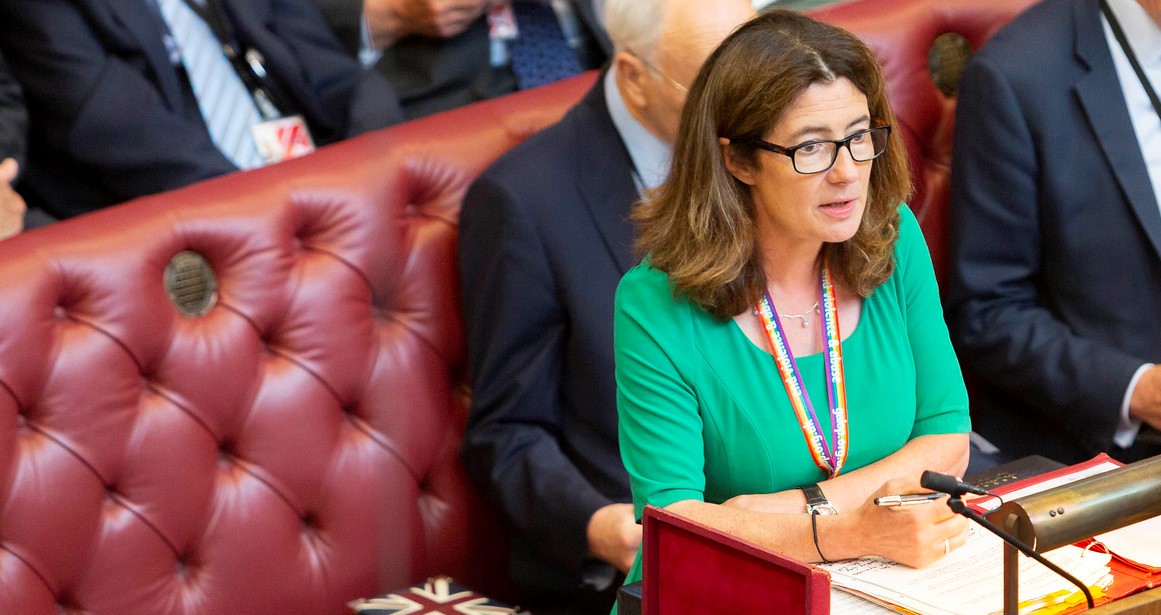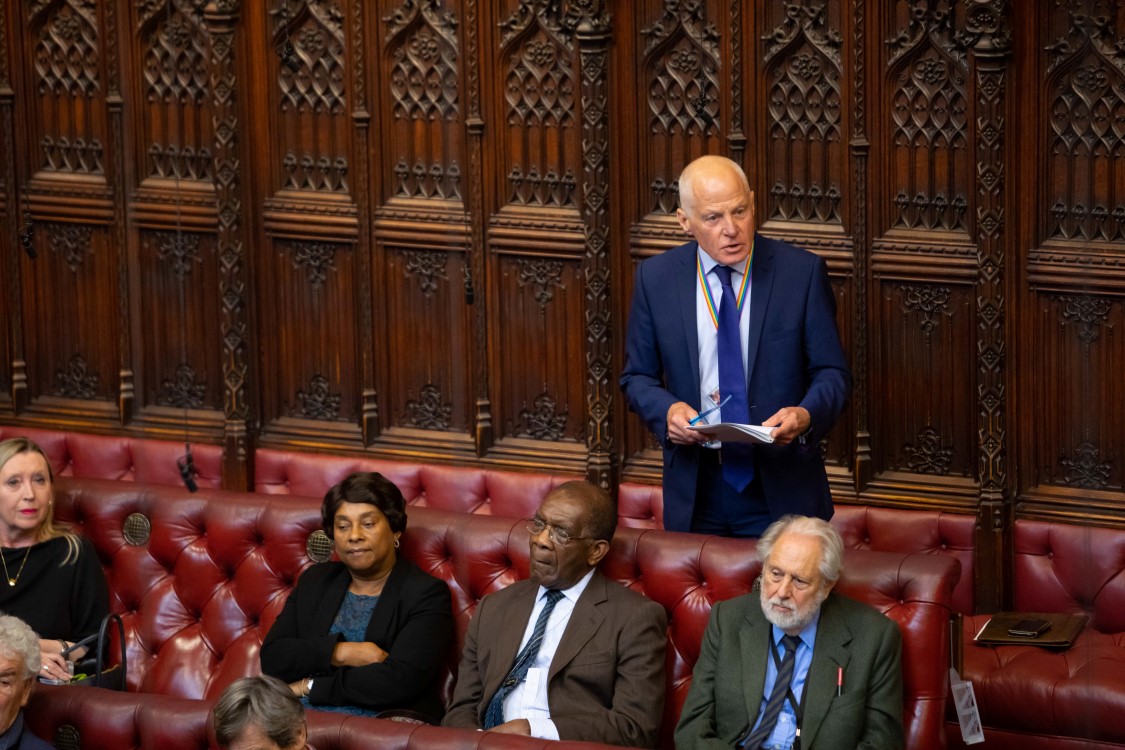LGBT+ History Month in the House of Lords
1 February 2022
During LGBT+ History Month, find out how the House of Lords considers the issues facing the LGBT+ community and the role members play to remove barriers and raise awareness for LGBT+ rights in the UK and abroad.
Police, Crime, Sentencing and Courts Bill
The Police, Crime, Sentencing and Courts Bill is currently making its way through Parliament. The bill aims to make wide-ranging changes across the criminal justice system in areas including police powers, judicial procedures and offender rehabilitation.
Members of the House of Lords have been using their expert knowledge and experience to help shape the bill through line by line scrutiny. They have suggested changes on a range of topics including police powers relating to protests and online hate offences.
Pardons for abolished same-sex crimes
The government recently put forward changes to the bill that will expand the disregard and pardon scheme for abolished same-sex crimes. It means anyone convicted or cautioned for consensual homosexual activity, under now-abolished laws, can apply to have them disregarded. This follows proposed changes to the law and campaigning by Lord Cashman (Labour), Lord Lexden (Conservative), Professor Paul Johnson, and others.
As part of this campaign, Lords members pressed the government for action in an oral question earlier in 2021. Watch the discussion.
These changes will also expand the scheme to make it available for the first time to members of the armed forces convicted of service-only discipline offences. The government has also announced a new review into the impact of the ban on homosexual personnel in the military that existed until the year 2000.
Members reaction

Speaking on the pardons for abolished same-sex crimes, government minister Baroness Williams of Trafford (Conservative) said:
'It really is a pleasure to introduce these government amendments to the House. In Committee, I gave a commitment that the government would consider carefully the amendment tabled by my noble friend Lord Lexden and the noble Lord, Lord Cashman, on the extension of the disregards and pardons scheme for individuals convicted of same-sex sexual activity. They withdrew their amendment then, and I am delighted today to be able to bring forward these government amendments which, I am pleased to say, have their support.'
Speaking at the end of the 'tidy up' of the bill at third reading, Lord Cashman addressed the House of Lords saying:
'It is truly historic when a state apologises for what it has done and reaches back over 500 years. It is the end of a six-year campaign that the noble Baroness, Lady Williams, has been an active part of. It might have been a six-year campaign, but some of us have campaigned for more than 33 years, not for ourselves but so that injustices can at last be put right."
Disregards and Pardons Timeline
1954 – Wolfenden Committee
In 1954 the government appointed a committee to review laws dealing with homosexual activity and prostitution. It was chaired by John Wolfenden (later Lord Wolfenden). In its 1957 report, the committee recommended the decriminalisation of private homosexual activity between consenting adults over the age of 21.
Read the House of Lords Library article about Lord Wolfenden and artwork commissioned by Parliament to commemorate the 1957 Wolfenden Report.
1967 – Sexual Offences Act
Lord Arran introduced the bill in the House of Lords and following support in both Houses it received Royal Assent on 21 July 1967.
The Act permitted homosexual acts in private between two consenting adults over the age of 21 in England and Wales.
The law was applied to Scotland in 1980 and Northern Ireland in 1982.
1994 – Criminal Justice and Public Order Act
The Act lowered the age of consent for gay men from 21 to 18. In 2001 it was further lowered to 16.
2012 - Protection of Freedoms Act 2012
Passed in the House of Lords in October 2011, the Act allowed for historic convictions for consensual sex between men to be removed from criminal records. The bill gained Royal Assent in May 2012.
2017 - Policing and Crime Act 2017
The government accepted changes to the Policing and Crime Bill, put forward by Lord Sharkey, Lord Cashman and Lord Lexden, to create posthumous pardons for convictions under certain abolished same sex offences. The changes also created pardons for those who had an offence disregarded under the 2012 scheme.
2021 - Armed Forces Act 2021
Following campaigning by members of the Lords and others, the Armed Forces Bill introduced in February 2021 included provisions to enable posthumous pardons for people convicted of historic, now abolished, offences while serving in the Army or Royal Marines. Similar provisions were made for the Royal Navy in 2017.
House of Lords podcast

Listen as Lord Cashman talks about his life and journey to the Lords, fighting for equality and co-founding Stonewall with Sir Ian McKellen, and how he aims to make a difference in the House of Lords.
Pressing the government for action
Recently, members have questioned the government on a range of LGBT+ related issues in the UK and abroad. These include:
17 December 2021
Baroness Noakes (Conservative) quizzed the government on its consultation document Banning conversion therapy, published on 29 October 2021. Find out more
8 December 2021
The Bishop of Durham asked the government whether it intends to publish the internal review looking into the assessment of asylum claims on the grounds of religion and sexuality. Find out more
Diverse membership
The House of Lords is made up of a diverse group of people with different experiences and expertise. Discover House of Lords members and their roles, and find out what topics members are speaking about in the chamber on any sitting day.
Stay up to date with the House of Lords membership
An inclusive employer
The House of Lords has been consistently ranked as one of the UK’s top employers for diversity and inclusion*.
Workplace Equality Networks
In partnership with the House of Commons it has established Workplace Equality Networks (WEN) for groups to support staff, provide a safe space to discuss issues of representation at work and to support the initiatives outlined in each House's Inclusion and Diversity Plans.
This includes ParliOut which aims to make LGBT role models more visible and accessible.
External recognition
The House of Lords has been recognised as one of the top 50 inclusive employers in the UK for the fourth year running.
Simon Burton, Clerk of the Parliaments, said:
‘We want to ensure that the House of Lords is a brilliant place to work for all our people, and our aim is for Parliament to be reflective of the communities we represent. In doing so, our work to create an inclusive and diverse environment for all continues every day. I’m delighted that our effort has been recognised within the Inclusive Top 50 Employers list for the fourth year running.’
Gold standard
In February 2022, the House of Lords was named among the UK’s Top 100 most inclusive employers by Stonewall and received their Gold Employer Award for efforts on LGBT+ inclusion.
Find out more about diversity and inclusion in the House of Lords.
*source Inclusive Companies
Get involved
Follow on Twitter
Visit @UKHouseofLords on Twitter for highlights of each day’s work in the House.
Follow the hashtag #HouseofLords for what’s happening, or #LordsQs for details of what topics members are pressing the government on at the start of each Monday to Thursday.
Other social media
Follow the House of Lords on Facebook, Flickr, Instagram, LinkedIn and YouTube for highlights, photos and videos from the UK Parliament’s second chamber.
Photo credits: House of Lords / Roger Harris
